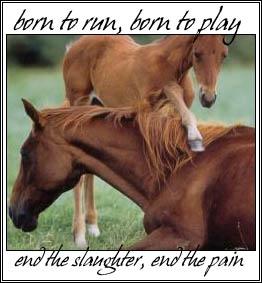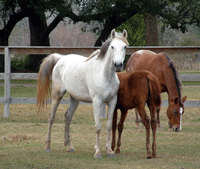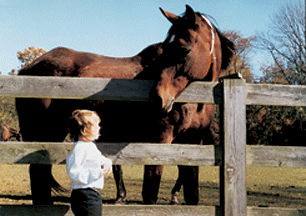
Posted by Laura Allen (Animal Law Coalition)
The Senate also prohibited BLM from using funds to kill healthy unadopted wild horses and burros!
Update Sept. 25, 2009: The Senate has voted to pass H.R. 2996, an appropriations bill for 2010 for the Dept. of Interior including the Bureau of Land Management ("BLM").
BLM manages the nation's wild horses and burros. In the bill the Senate made clear to the BLM: Appropriations ... made [in this bill]shall not be available for the destruction of healthy, unadopted, wild horses and burros in the care of the Bureau of Land Management or its contractors or for the sale of wild horses and burros that results in their destruction for processing into commercial products.
This mandate was proposed by Sen. Mary Landrieu (D-LA). This provision must still be approved by the U.S. House.
Also at Sen. Landrieu's urging, the Senate Appropriations Committee found "the costs for gathering and holding equines to control populations on public lands have risen beyond sustainable levels. The Committee directs the Bureau to (1) consider private proposals for long-term care of wild horses and burros; (2) create a bidding process among such proposals, and (3) prepare and publish a new comprehensive long-term plan and policy for management of wild horses and burros that involves consideration and development of proposals by non-governmental entities, by September 30, 2010."
The Committee "encourage[d] all Federal agencies that need and use horses to fulfill their responsibilities to first seek to acquire a wild horse from the Bureau of Land Management, and, prior to seeking another supplier for usable horses, document why the Bureau cannot meet the needs of the inquiring Federal agency." The Committee "encouraged" BLM "to develop an expedited process for providing wild horses to local and State police forces."
Sen. Landrieu told the Senate,
"We ... are down to just a few herds of horses. And the reason that i think that this is even more important than to just western states or the ranchers or landowners or humane society and others is because for the people generally, the idea of wild spaces with wild horses is something that is really part of our heritage. And we want to make sure that that heritage isn't lost, that we're being responsible in terms of the way the land is being used for multiple purposes and from the perspective of horse advocates, that the horses themselves are being treated fairly.
"And none of that right now is being done in the way that most people, i believe, would appreciate or would be satisfied with. There have been any number of studies that i'm going to submit to the record.
"Most recently, the congressional research service as well as the government accounting office has suggested major changes to the program. I'm just going to go through a few possible options. One, the creation of several public-private sanctuaries. This has been suggested by a few fairly high-profiled individuals in our country. The idea has merit. We are working with a variety of different groups along with the department to think about the possibility of creating public-private partnerships, large sanctuaries, maybe 500,000 or a million acres where thousands of wild horses could not only roam freely in a healthy way, but they also could potentially become ecotourist opportunities for some of the states and communities as it would be an attraction that could potentially make money and attract people out to some of these western areas. Or, for that matter, grant rural areas in other parts of the country.
"There is a possibility to make some smart investments to step up some of the adoption programs that might work. And there are any number of scientific and new technologies that can be brought to bear in terms of breed management, reproductive issues that could help us get a much more cost-effective, sane and humane approach to this problem."
FOR MORE INFORMATION ON HOW YOU CAN HELP, OR TO READ MORE ON THIS STORY, PLEASE VISIT THE "ANIMAL LAW COALITION'S" WEBSITE AT:
http://www.animallawcoalition.com/horse-slaughter/article/693
Thank you for visiting my blog and reading the updates! I hope the things I post helps keep everyone up-to-date and informed with the true facts. Please have a great day, until next time. Take care!
Are you doing all you can to make this world a better place to live in?








